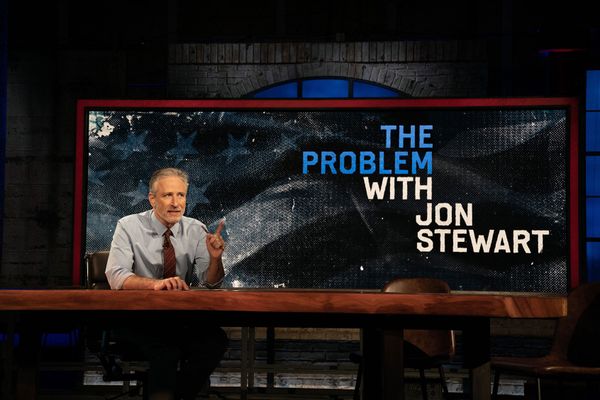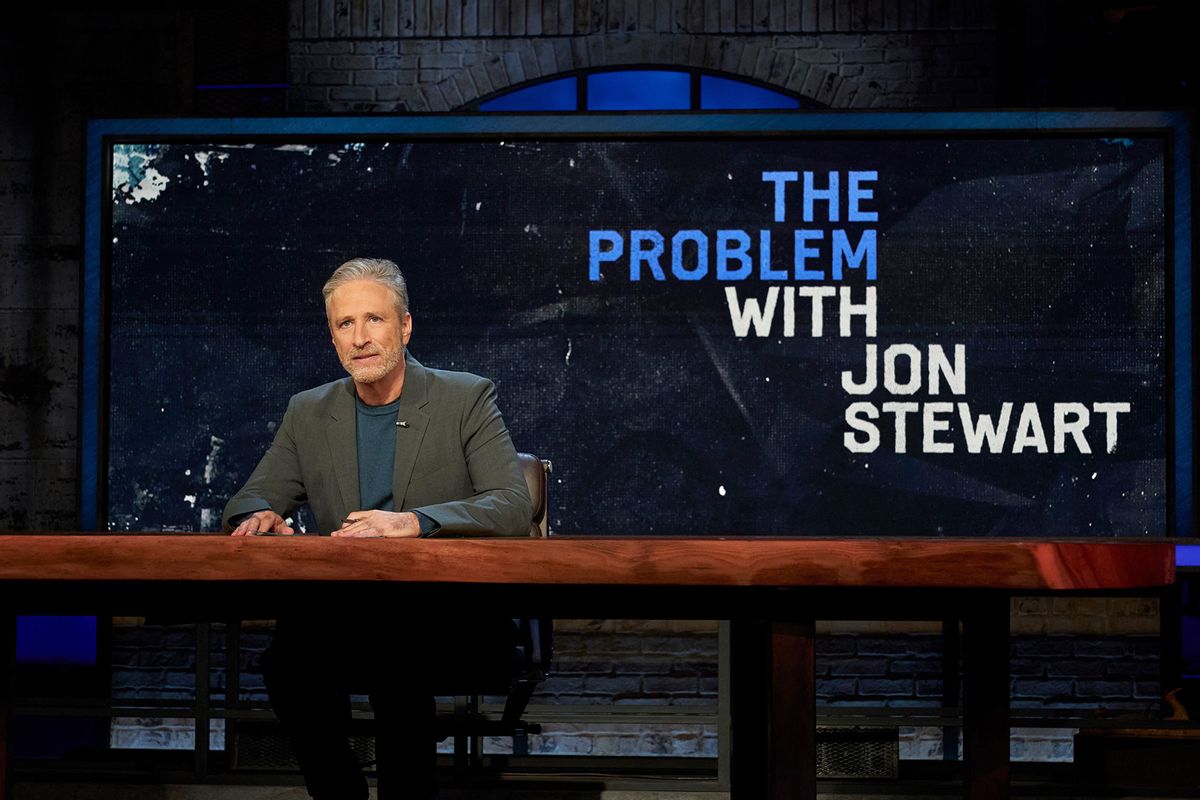We are truly living in strange days when one can suggest that Jon Stewart might – and this is a very flimsy might — find more welcoming employment terms with a company whose primary source of revenue is not related to phone, computer or tablet sales globally.
Only he and the people closest to him know whether he’s interested in going down those avenues. All that the rest of us know is that “The Problem with Jon Stewart” is finished on Apple TV+.
According to the New York Times, where the story first broke on Thursday, Stewart's decided to end the show due to creative differences over proposed topics and guests for the upcoming season.
It's hard to picture Stewart agreeing to produce a topical talk show for anything less than complete editorial control.
The Times, quoting an insider, said that the former host of “The Daily Show” told his staff that Apple’s executives were particularly concerned about the show taking on China and artificial intelligence.
Stewart and his staff also predicted they’d face more pushback as the 2024 presidential campaign season accelerated, another source said.
With that likelihood looming, Stewart bounced. It’s hard to blame him. I also suspect he knew this impasse was inevitable.
When Apple announced it was moving into the original content business in 2019, it reportedly threw vast sums of money at A-list creatives to supply original content for its iPhone and iPad customers.
The company brought Stewart into its fold in 2020, six years after he signed off from “The Daily Show,” which he hosted for 16 years. It's hard to picture Stewart agreeing to produce a topical talk show for anything less than complete editorial control.
Stewart constantly reminds people that he isn’t a journalist despite demonstrating the type of interviewing tenacity and prowess that many reporters could learn from. But at "The Daily Show" he was part of a company that also owns CBS, which has a long history in the TV news business and understands the ethics of keeping business concerns separate from its newsroom's editorial choices.
Apple, in contrast, is a tech company whose CEO Tim Cook was reported by the Wall Street Journal in 2018 to be very hands-on in terms of deciding the suitability of its streaming service’s content. If that isn’t the case anymore, Apple still prioritizes the tech side of its business, demonstrated by Cook’s unexpected visit to China earlier this week.
We need your help to stay independent
China is Apple’s third largest consumer market after Europe and the Americas. Those concerns were always going to be on a collision course with Stewart’s application of inquisitive skepticism to, say, the problematic repressive policies of a certain Asian superpower.
"The Problem with Jon Stewart" could have chosen to ignore China, but for how long? That nation owns nearly $860 billion of the United States’ debt. It’s a major trade and manufacturing partner and influences our politics to a significant degree. Most of the newest iPhones are made there.
China is also a major American entertainment consumer whose audience can make or break a film’s global success at the box office. Regarding the AI question – again, Apple is a behemoth in an industry focused on automated efficiency. In no universe could Stewart deliver an honest report on the subject while working there. But with mainstream news covering it more frequently, it would not go unnoticed if he were to skip it.
 Jon Stewart in the “Midterms” episode of season two of “The Problem With Jon Stewart" (Apple TV+)It would be simple to lump “The Problem with Jon Stewart” in with other short-lived topical talk variety shows as another indicator that the format doesn’t work on streaming services. But this cancellation evinces something else. As tech companies increase their hold on the news and information space – of which “The Problem with Jon Stewart” was a part – we are seeing more examples of the people who run them exerting control over the flow of information. This was a major concern when Amazon founder Jeff Bezos purchased The Washington Post a decade ago but, until recently, he stayed out of its newsroom. (No longer.)
Jon Stewart in the “Midterms” episode of season two of “The Problem With Jon Stewart" (Apple TV+)It would be simple to lump “The Problem with Jon Stewart” in with other short-lived topical talk variety shows as another indicator that the format doesn’t work on streaming services. But this cancellation evinces something else. As tech companies increase their hold on the news and information space – of which “The Problem with Jon Stewart” was a part – we are seeing more examples of the people who run them exerting control over the flow of information. This was a major concern when Amazon founder Jeff Bezos purchased The Washington Post a decade ago but, until recently, he stayed out of its newsroom. (No longer.)
Elon Musk’s purchase of Twitter, which he since renamed X, was followed by the senseless smearing of public trusts such as NPR, PBS, the Canadian Broadcasting Corporation and the BBC. Misinformation runs rampant on X. Journalists are abandoning it ahead of the election.
"The Problem with Jon Stewart" could have chosen to ignore China, but for how long?
Perhaps more relevant to Stewart’s situation is the example set by Netflix in 2019, when it pre-empted an episode of Hasan Minhaj's "Patriot Act" that criticizes the Saudi-led War in Yemen and Crown prince Mohammed bin Salman. It was pulled from streaming in Saudi Arabia. At the time the company said they were simply complying with local law, but humanitarian and free speech advocates feared the company's decision would have a chilling effect.
Want a daily wrap-up of all the news and commentary Salon has to offer? Subscribe to our morning newsletter, Crash Course.
As yet unknown is whether Stewart will set up shop at another network. I mean, would Warner Bros. Discovery be as thin-skinned as Apple? It regularly puts up with "Last Week Tonight" host John Oliver calling it “business daddy” in proximity to jabs like “I do get the vague sense that you're burning down my network for the insurance money, but I'm sure that that will all pass!" and doesn't blink.
This is not to imply that WBD, Paramount, NBCUniversal or Disney, which owns ABC, are any nobler than their tech-based competition. The AI question would have rattled somebody at the top tiers of those organizations, too. But those conglomerates seem to view figures like Stewart, along with Oliver and their former “Daily Show” co-worker Stephen Colbert, as essentially very shiny scales on their gargantuan dragon bodies. Sometimes one or two cause an itch, but that subsides.
Still, it’s disappointing to lose Stewart’s weekly deep dives when we need them most. With war exploding between Israel and Hamas and the media doing a poor job of countering government spin; with the GOP unable to elect a Speaker of the House; and, pertinently, without a permanent host steering “The Daily Show,” viewers could use his blistering insight and common sense. Some network executives may agree with that. Unless they also allow the host to do what he does best without censorship, we may have seen the last of Stewart taking on major problems for a while.



Shares